By Pepper Parr
BURLINGTON, ON. It has been a banner week for BurlingtonGreen. They held their annual meeting, installed a very strong board and heard a stirring story about how a quarry proposal in Dufferin County was defeated. Later in the week after a very bumpy ride through several Standing Committees they got a sole sourced agreement with the city to continue developing the community garden concept that has done so exceptionally well.
Let’s take this one step at a time: The new board is made up of: Todd Mooney, Gloria Reid, Neil Sentanie, Vanessa Warren, Ken Woodruff, Chuck Bennet, Colin Brock, Susan Fraser and Paul Haskins who will serve as president.
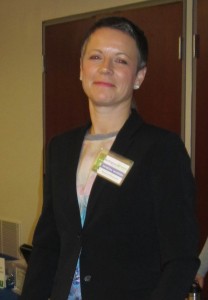
Vanessa Warren will add to the already impressive delegation skills BurlingtonGreen takes before various levels of government.
BurlingtonGreen has become the go to community organization you want to be part of in this city. This year two of the impressively active community leaders joined the board: Vanessa Warren who formed the Rural Burlington Greenbelt Coalition that brought the landfill dumping in north Burlington to a grinding halt when she delegated to Burlington and Regional Council and Gloria Reid who brought some impressive thinking to the creation of a Community Engagement Charter. We wish Ms Reid had stayed with that project and gotten it out of the clutches of the upper reaches of city hall where is will suffocate from the dust on the shelves it sits on.
The BG AGM brought in Donna Tranquada to talk to them about the successful effort to stop the application for a quarry permit in Melacanhom Township which is north of Caledon and south of Collingwood.
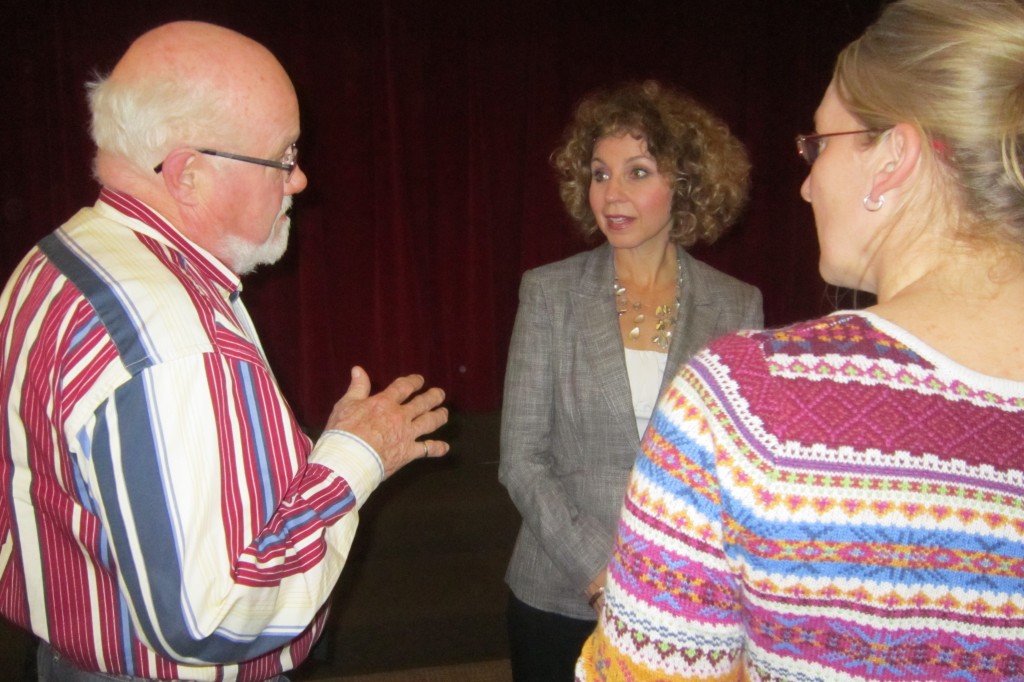
Monte Dennis in conversation with BurlingtonGreen guest speaker Donna Tranquada. Dennis was part of the Pickering airport battle more than 25 years ago. He could tell Tranquada some real horror stories.
What was really interesting and odd was that Ms Tranquada made no reference to the PERL success with the Nelson Aggregate fight – that win paved the way for the change in the way the public reacted to any expansion of quarries and their development . The Nelson win was the first time a quarry looking to expand was turned down. The Food and Water First people knew a good thing when they saw it though: they had Sarah Harmer out to their events as well
 Donna Tranquada had a great story to tell. A year to the day of the BG AGM, a group that was formed to protect thousands of acres of farmland from a planned massive quarry operation learned that the company had withdrawn its application to develop a quarry. It took more than a year to beat back the proposal put together by an American, Boston-based hedge fund, that was buying up property in the township.
Donna Tranquada had a great story to tell. A year to the day of the BG AGM, a group that was formed to protect thousands of acres of farmland from a planned massive quarry operation learned that the company had withdrawn its application to develop a quarry. It took more than a year to beat back the proposal put together by an American, Boston-based hedge fund, that was buying up property in the township.
When that company began buying up farm land they said they wanted to create a large, world-class potato farming operation. Property by property they told farmers what they were doing and got to the point where they had purchased more than 30 farms. “It didn`t take long” Tranquada explained “for word to get out in that rural community that something was going on.” The company, called Highland had been incorporated in Nova Scotia, and had begun using pressure tactics on some of the holdouts – meeting with farmers and putting a cheque for more than $1 million on the table and saying the offer was good for just 24 hours. The community began to get uneasy.
Then came the announcement: Highland had filed an application with the province for the largest quarry in Canadian history on some of the best farmland in Ontario and at the headwaters of five river systems. The mega Quarry would have sprawled across 2,316 acres and would have plunged 200 feet below the water table on a 15,000 acre plateau of Class 1 farmland. The massive open-pit limestone quarry would have put rare agricultural soil and precious water resources at risk in Melancthon Township.
One of the studies showed that the quarry would have to pump out 600 million litres of water a day forever. You had to be in the room when Tranquada used the word forever. She is a bit over 5ft 5 inches and she literally spit out the word.
Donna Tranquada`s talk was “meat and potatoes” for the protest movement crowd – it was a crowd like this that stopped the Spadina Expressway in Toronto; that stopped the extension of the Gardiner Expressway in Toronto through the Beach community and parts of Scarborough. The same demographic stopped the first attempt to put in an international airport in Pickering.
When Burlington was threatened with a highway being rammed through the Niagara Escarpment close to 400 people showed up at the Mainway Arena on Walkers Line – and the province eventually backed off. The province will have another go at an Escarpment highway and it will take a different generation to fight that battle.
The Melancthon Township battle used ideas that pulled together the interests of the rural communities with the needs of the urban dwellers – then used food as the bridge between the two.
Chefs from Toronto and other urban centers made soup, thousands of bowls of soup that was both a fund-raiser and the way to connect farmland where food is grown and the stomachs of the people in cities who have to eat. The event became known as SoupStock and it drew crowds in the tens of thousands.
It was a magnificent collection of ideas and dedicated people who showed once again that the public can prevail. Highland had employed one of the biggest public relations companies in North America who knew they were up against a public that was driven and focused – rarely can that kind of energy be beaten.
Tranquada said that on one Saturday there were 40,000 people who dropped into a large park in the east end of Toronto to hear the story about the quarry application. If you believe in an idea and you can get your troops out – you can prevail.
Burlington has a fight on its hands that is critical for the city and relevant to every municipality that has a small airport and problems with landfill sites. While many expect the city of Burlington to prevail through the several levels of appeal that can be expected of the decision that decided the city had the right to have its site bylaw adhered to, the bigger question is – what des the city do with that property once the Court issue is resolved. There are hundreds of tonnes of landfill in the more than 100 + acres of property and a runway that is in the process of being paved.
Tranquada, surprised some people who asked where they could get one of the signs that she had with her. “I just have the three “she explained – “that was all I was able to carry on the subway and the GO train. A high-profile media personality trudging from Toronto to Burlington on the GO train is what they call “waking the talk”.
Tranquada is now part of a group that goes from community to community with the message: “There aren’t a lot of victories these days, but the mood-altering blocking of the monster quarry in Melancthon Township in potato country a year ago was a brilliant model of how to get stuff done. The alliance of urban ecos, farmers, foodies and chefs showed the power of partnering, bridged the messy city-country divide and ultimately triumphed over a Boston-based hedge fund… Plus, it made the point with the mass soup-athons, that protests can be jubilant and very digestible – and that determination and positivity are our best weapons.”
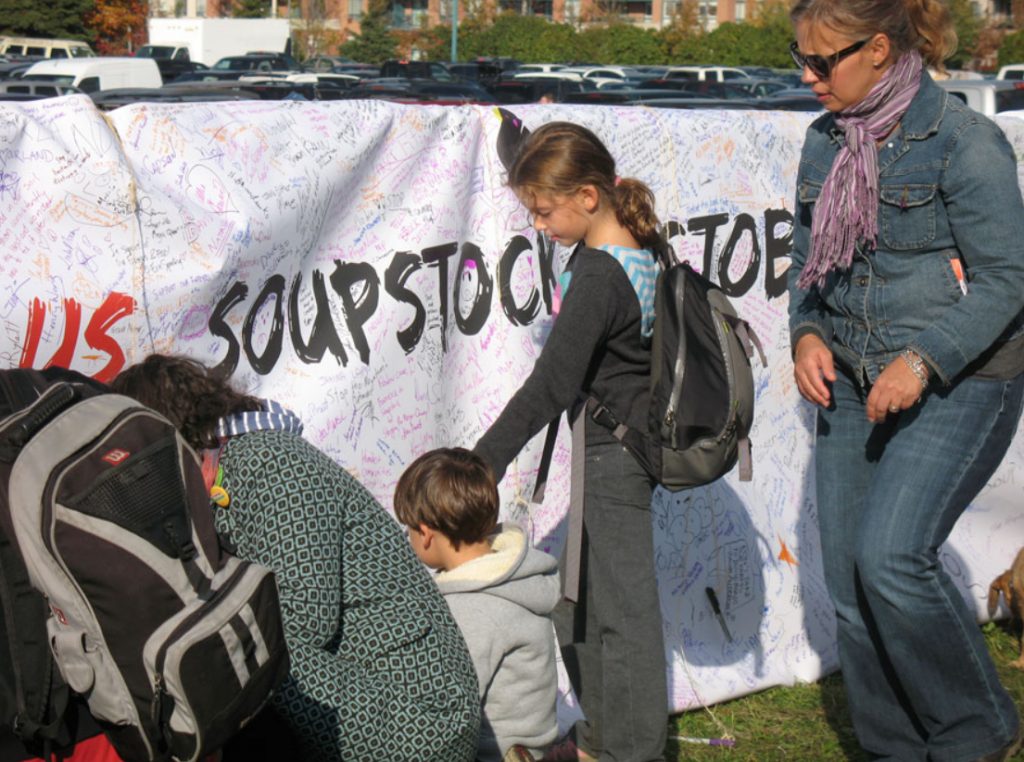
And those crowds sign a petition – and with public reaction like that – the company wanting to quarry prime farmland withdraws their application.
With the farmland in Dufferin County saved, the group, known as Food and Water First, decided to get to the real core issue which was the Aggregate Resource Act – it sets the rules for the extraction of aggregates. Turns out Ontario has the weakest regulatory environment governing resource extraction in Canada, enabling anyone to pillage the very resources Ontario needs to drive parts of its own economy.
The Food and Water First people have taken the position that the aggregate producers require a “social license”, that is the permission of the wider community, to do what they do. That concept will be hard for some of the old-timers in the industry to digest but it is a changing world – Global Warming is real and both food and water will become the most critical elements of our society continue to exist.
There is legislation and policy that govern the activities around resource extraction in Ontario. The Ontario Sand, Stone and Gravel Association (OSSGA) chose to push for keeping things as they are instead of helping to create a document that would lessen rural strife and have them become a responsible corporate partner. OSSGA members will continue to be challenged by communities in which they want to do business and will have to defend their businesses. Instead of doing better and voluntarily recognizing that prime farmland and source water regions should be off-limits, OSSGA has clearly belittled the efforts of thousands of Ontarians who have so reasonably engaged in this policy development process. The public at large will continue to withhold that social license until there is modernized legislation.
Nothing in the Aggregate Resources Act (ARA) review document would prevent another Mega Quarry application tomorrow, destroying forever thousands of acres of our most productive farmland and putting the control of unbelievably vast amounts of Ontario’s fresh water in danger.
Food and Water First wants to see new legislation that recognizes prime farmland as a strategic provincial resource and protect source water regions by eliminating industrial extraction in those regions.
These social activists believe that as an engaged public, both urban and rural, we have had all kinds of assurances from MPPs that the thousands of people had been heard. Now is the time for those MPPs to act, not just speak.
A productive board meeting; the story of a community action that saved precious farmland – and the week wasn’t over. BurlingtonGreen went on to get the city behind their community garden project – but that’s another story.















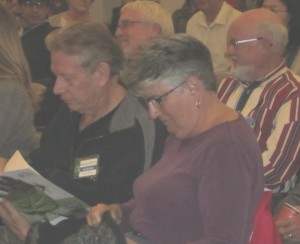
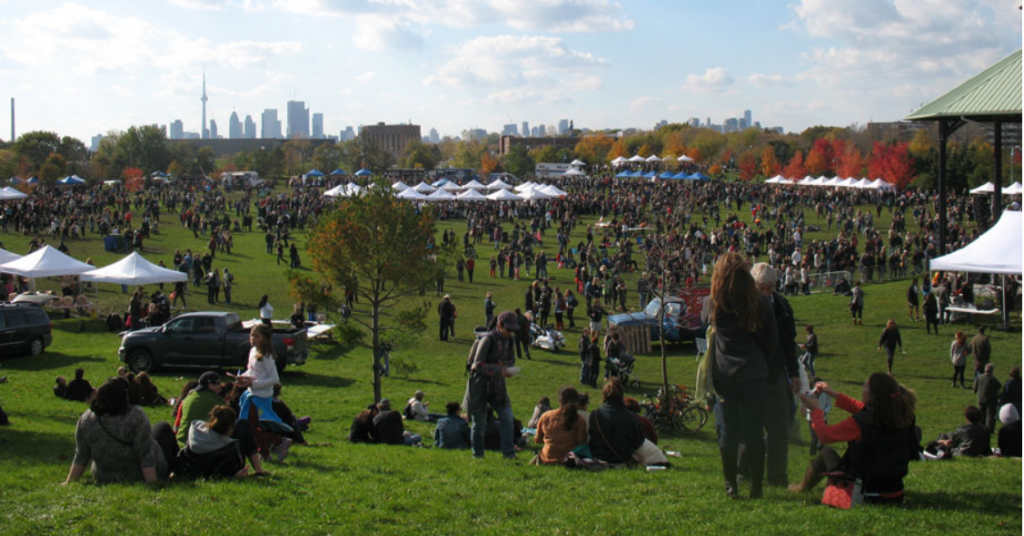
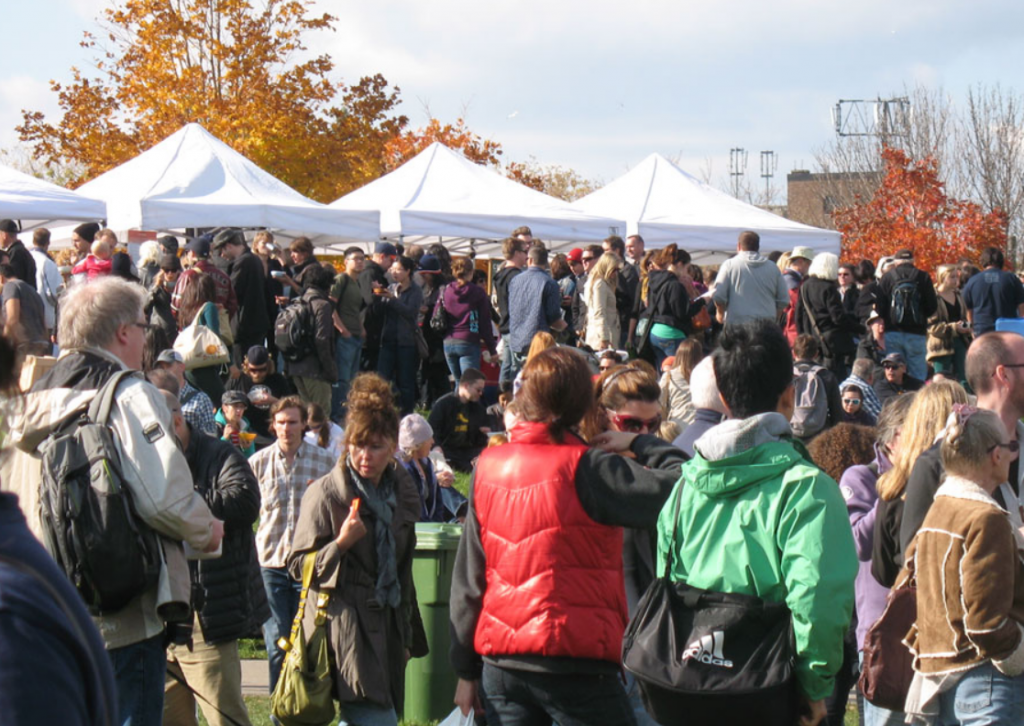


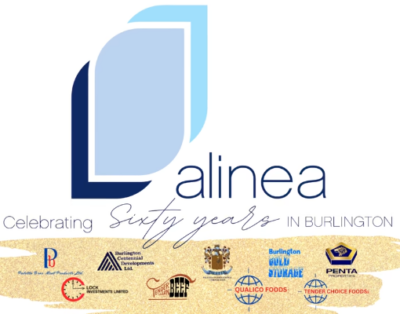

I was delighted to be the guest speaker at the BurlingtonGreen AGM and enjoyed sharing the story of the Mega Quarry campaign with such an impressive group of dedicated and engaged citizens. When I read the above article today, I did write you to say I thought the story was terrific. But I also pointed out a concern.
I wrote that I may have misunderstood your question about PERL and its victory. I, of course, knew about the win. We followed PERL’s campaign closely and Sarah Harmer performed at Foodstock. I thought you asked whether PERL’s victory may have played a role in Highland’s decision to abandon the mega quarry. That’s why I said I didn’t know. Highland has never fully revealed why it withdrew its application for the mega quarry so, we simply don’t know if the PERL victory influenced its decision.
Unfortunately, because of this misunderstanding your readers may be left with a false impression that I was unaware of PERL’s hard work. That is not the case.
As for Sarah Harmer, she kindly volunteered her beautiful voice and passion to Foodstock. We are forever grateful to her and her fellow musicians for standing with us throughout this remarkable campaign. Thanks again to the members of BurlingtonGreen for a wonderful evening and for partnering with Food & Water First.
I am not impressed with Pepper’s (what kind of name is that) editorial. That is what it is. A commentary not a report.(You should also check your spelling as you have errors.)
Written with an arrogant tone, intentionally cutting people down but I understand that is his style. Sloppy reporting not worth reading.
Editors note: Pepper is the name my Mother gave me. She liked it. Donna Tranquada, the guest speaker sent us a note: “I read your story this morning and thought it was terrific.”
The news business is changing: the old srict reporting and editorializing has given way to putting information in context. It might take some getting used to.
We do have a bit of a problem with some of the spelling – working on that.
He also spelled Monte Denis incorrectly. Under the photo, it mentions Monte Denis and then spelled his last name Dennis. Which is it?
I really have to respond to my name being spelled incorrectly. I have lived with this all my life, however usually my last & first names get reversed.
SO that’s why I now introduce myself as just Monte.
Editor’s note: Single malt for Mr. Dennis and out apologies as well We fixed the error.
In the first line “BuringtonGreen” is spelled incorrectly and the mega-quarry was proposed in “Melancthon”. The main inspiration for the mega-quarry fight (other than righteous indignation) was the eleventh hour success over the Site 41 proposed landfill in Tiny Township. A lot of the Site 41 Volunteers including First Nations took up the fight against the mega-quarry. Other inspirations were the cancellation of the Caledon Rockfort quarry, the proposed Flamborough quarry and PERL’s Nelson Aggregate win. (I believe the Nelson decision marked the first time a quarry expansion was rejected in the Niagara Escarpment showing the power of the Aggregate Resources Act — no space is sacred.) However, those latter aggregate wins put the onus on the “need” for large Ontario aggregate sources, which made the mega-quarry fight harder. Ultimately we stopped the mega-quarry because the proponent withdrew the application but that “win” does not stop prime farmland from being purchased for the same purpose again. So the “Food & Water First” movement was launched to remind Ontarians of the importance of foodland and source water and to change Ontario’s laws to protect these necessities for future generations. “Food and Water is life, no matter who you are or where you are.” We ask our government representatives to prioritize “Food & Water First” in their decision-making. http://www.FoodAndWaterFirst.com
Editors note: Our understanding is that BurlingtonGreen is used as a single word.
You forgot the “l” in Burlington. Picky but glaring because it is in the first line 🙂
Editors note:
We did forget the l – darn.
Tremendously uplifting story on fighting the good fight against “big guys” whoever they might be. The “little guys” must have the message and mass to do it, but as shown, it can be done. Burlington has triumphed before against a quarry and now an airpark landfill, but only with strong leaders from the public prodding and pleading with their elected leaders to act.
There are still issues in Burlington where the elected leaders have ignored the public will. Luckily, I believe these issues are still ongoing and still have a chance for a proper and true public participation. We must always remain vigilant.